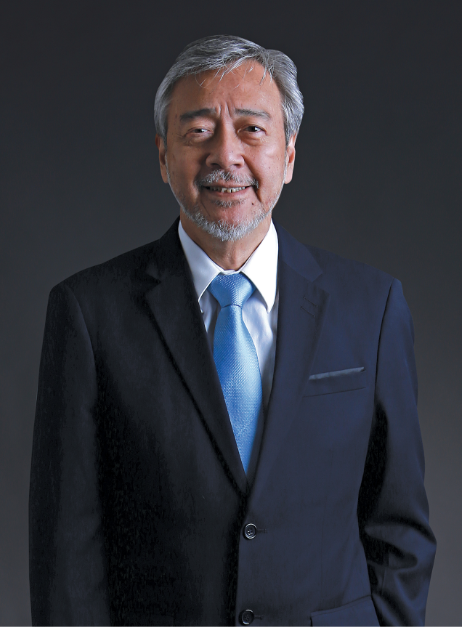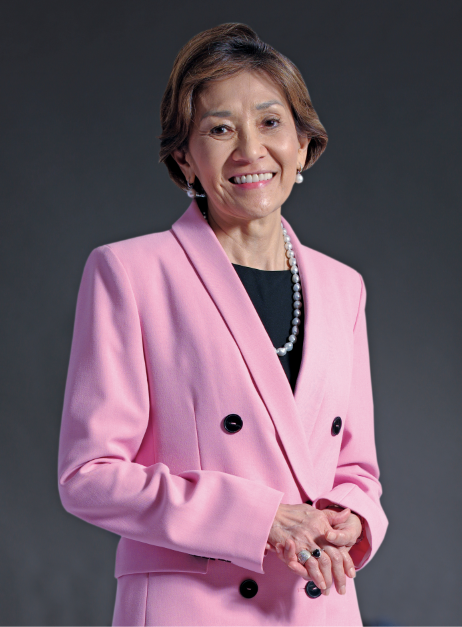A Message from the Chairman
Dear Fellow shareholders,
The year 2020 will be remembered as the year that tested the character, resilience, and adaptability of people all over the world because of the COVID-19 virus. The pandemic’s impacts were staggering, resulting in the shrinking of the global economy estimated at four percent in 2020. This required systematic preventive measures to contain the virus, stimulus packages, and massive government spending to provide some relief to most economies.
In the Philippines, the pandemic’s effect on the economy was a full-year Gross Domestic Product (GDP) contraction of 9.6 percent, the steepest annual drop recorded by the Philippine Statistics Authority since it started collecting data in 1947. Household consumption fell by 7.9% in 2020 with unemployment rate peaking at 17.6% in the second quarter of 2020. Investment spending retreated sharply, declining by more than one third during the year. These trends were reflected in the contraction in Metrobank’s loan portfolio, which is aligned with GDP growth. Commercial clients reduced inventory levels and deferred expansion plans while for consumer loans, customers limited their spending to essential goods and deferred big ticket purchases.
The Government stepped up and implemented measures through the “Bayanihan to Heal as One Act,” and its extension, “Bayanihan to Recover as One Act” to combat the impact of the pandemic. On the monetary side, the Bangko Sentral ng Pilipinas (BSP) reduced key policy rates by a total of 200 basis points and deployed regulatory relief measures to complement fiscal stimulus and help revitalize the economy.
Faced with a challenging environment in 2020, we, at Metrobank, intensified our level of commitment to our customers and communities. We had to balance the need to service our clients while ensuring the safety of our employees. At the same time, the pandemic offered opportunities to serve the community. “Meaningful Banking in the New Normal” has propelled us to transform the challenging year into a record of heartfelt service to our stakeholders.
Caring was the mantra that rallied Metrobankers to work as a team to support communities and frontliners to combat and mitigate the impact of the pandemic. Under the “Helping Hands for COVID-19,” Metrobank Foundation, Inc. (MBFI) and GT Foundation, Inc. (GTFI) provided Php321.5 million that directly helped 497,189 individuals or 113,200 families. These included donating personal protective equipment (PPEs) to both medical and security frontliners; providing polymerase chain reaction kits and antibody rapid test kits to private and government hospitals and local government units; and constructing molecular laboratories for testing COVID 19 samples. We donated water, sanitation and hygiene (WASH) facilities, learning materials, tablets, laptops and other equipment to schools and students to aid them to adapt to the new normal of blended learning. We continued to distribute food and relief packs to underprivileged communities.
Likewise, Metrobank is an active partner in the “Ingat Angat Tayong Lahat” campaign, in support of the Government’s Taskforce T3 (Test, Trace, Treat) initiative. This multi-sector alliance aims to rebuild consumer confidence while safely restarting the economy through continued public-private sector cooperation. MBFI and GTFI implemented a robust, medium term emergency response plan through strategic partnerships to complement efforts of the government and other stakeholders that look after the needs of communities. In addition, 6,823 Metrobankers contributed Php9.2 million to various Purple Hearts Club programs, reflective of the spirit of service rendered to others beyond the call of duty.
Our customers were on top of our minds as we prioritized opening communication channels with them. In opening our branches, we conformed to the health and safety protocols mandated by the government to ensure the safety of our customers and employees. With restriction on face-to-face encounters and visits, we saw the need to use digital technology to stay in touch with our customers. We launched webinars to educate and inform them on how to manage and protect their resources during the pandemic. To make banking more accessible, we launched an improved Metrobank Online facility, where banking and transacting anywhere and anytime is made possible and easier. We also fully implemented the provisions of the Bayanihan measures to provide relief to our borrowing customers.
Our employees are frontliners in every sense of the word. We strived to ensure that their health, safety and well-being were guaranteed at all times as they worked onsite and provided the back-end support when they worked from home. We continued to enhance their expertise through training as they attended to the growing and unique demands of customers in this new normal. As the pandemic is still ongoing, the procurement of COVID-19 vaccines for our employees and their dependents is an integral part of our efforts to ensure welfare of our employees this year.
We are thus pleased to report that despite the difficult operating environment, Metrobank managed to deliver a strong 26% rise in pre-provisioning profits of Php61.8 billion in 2020. Indicative of our solid deposit franchise, low-cost current and savings accounts (CASA) grew 22% to Php1.3 trillion. Lower funding costs led to a modest jump in net interest income. In addition, the record low interest rate environment enabled the Bank to optimize its investment portfolio and generated a hefty Php19.2 billion in trading and foreign exchange gains.
Our strong revenue generating power complemented by improving operating efficiency afforded the Bank the capacity to be more proactive and to quadruple our provisions for non-performing loans (NPLs) to Php40.8 billion, which pared our net income to Php13.8 billion. Our experience during the Asian Financial Crisis has made a deep impact on the manner we are managing our portfolio. We learned that we need to be proactive in monitoring accounts and build up reserves aggressively early in the cycle. We thus ended 2020 with an ample 163% NPL cover. Our capital ratios are among the highest in the industry at 20.2% capital adequacy ratio (CAR) and 19.3% Common Equity Tier 1 (CET1) ratio, well above regulatory limits.
Keeping a healthy NPL buffer and strong capital position are vital as pandemic conditions continue to persist, which could make 2021 another challenging year. We will continue to safeguard the group’s asset quality. We will sustain our ability to provide banking services, either through our branches or remotely, with utmost regard to protecting the health of our employees. We will intensify our efforts and investments in digital platforms and technologies. At the same time, we are ready and have substantial capacity to actively seek opportunities to support the needs of our customers as the economy begins its recovery journey. Alongside this, we will monitor economic conditions and will continue to implement strategies that will balance growth, improve shareholder returns and meet regulatory requirements on a sustainable basis. Finally, we will not waver in our Corporate Social Responsibility (CSR) commitments to the community.
To our employees and frontliners, you are our stronghold and the faces of Meaningful Banking in the New Normal. Thank you for your continued dedication and commitment.
To our Board of Directors and Senior Management, thank you for your wisdom, guidance, and decisive leadership in steering us to strengthen our position.
To our partners, investors, and shareholders, we appreciate your continued deep trust and confidence.
And finally, to our dear customers, you are in good hands as we continue to provide you with meaningful banking for all your financial needs. Your unwavering loyalty inspires us to assure you of true service beyond banking.
The President's Report
The world just became smaller when the first COVID-19 case was detected in January 2020. More than a year and millions of lives affected, the pandemic’s alarming spread brought economic activity to a lethargic growth as countries imposed tight restrictions on movement to stop the spread of the virus. The economic damage is evident as health and human toll grows, representing the most massive economic crisis the world has experienced in decades. The world’s economy shrank by an estimated four percent last year despite extraordinary, concerted efforts of governments to counter the downturn with monetary and fiscal policy initiatives.
The Philippines was not spared. The economic impact of the global pandemic was swift with the GDP declining by 9.6%. The BSP’s accommodative monetary policy which led to record low interest rates and injection of around Php2.0 trillion liquidity into the system via purchase of government securities have helped ease the financial impact of the pandemic. The global scale of the crisis has however left us concerned that the damage will be felt over a period of time.
Weathering through this pandemic can only be overcome by adaptability anchored on our core values: passion for results, integrity, teamwork, commitment to customer service and a heart for community – the cornerstone of the kind of service our people extend to our customers daily. We prioritized the people that mattered most in our business – our customers, our co-employees, and our neighbors.
Attending to our customers demanded a level of service that extends beyond banking, that sincerely cares for their well-being. We protected our customers by following government mandated protocols in branches; enhanced our services that brought more convenience to their banking transactions; listened and quickly responded to their concerns; and educated them through information campaigns and webinars to expand their financial literacy and make better informed decisions on their investments. In turn, more customers utilized the Bank’s digital platforms. Around 24% of our customers are now enrolled in electronic channels which include the Bank’s mobile app, online platforms for corporate and retail clients, ATMs, and point of sale (POS) terminals. Likewise, 85% of financial transactions now go through such electronic channels. We adhered to the provisions of both the Bayanihan to Heal as One Act and Bayanihan to Recover as One Act to provide relief to our customers.
Caring for our employees required us to put in place communication mechanisms that enabled them to step up their game while attuned to their well-being. Our work from home teams were equipped with laptops and Virtual Private Network (VPN) connectivity to ensure uninterrupted service to customers. Chatbot was deployed in Workplace, the Facebook-powered internal communication portal for employees, run by employee-volunteers who help address professional and personal queries from fellow employees. The portal provided COVID-19 related updates and information and facilitated quick general wellness surveys that help teams build safe work habits. Those who were required to report in our offices were supported with allowances, hygiene kits, and required to strictly observe appropriate safety protocols.
In managing the impact of the pandemic on the Bank’s portfolio, we were reminded of the lessons during the 1997 Asian Financial crisis (AFC). The AFC exposed corporate over-leveraging on foreign currency debt, which resulted in insolvency issues and took several years to unravel. We learned that banks should be more proactive at the onset – (1) to actively engage with clients to manage credit risks; (2) boost provisions while the Bank still has the earnings capacity to do so; (3) secure ample liquidity to withstand any funding volatility; (4) ensure capital base is strong so there is enough buffer against the potential stress to asset quality and meet regulatory requirements; and (5) maintain robust risk management and corporate governance structures.
Metrobank’s income before provisions increased by 26% to Php61.8 billion in 2020. The growth in operating income was supported by strong revenues and better operating efficiency.
In line with our strategy to prepare for the risks associated with the pandemic, the Bank quadrupled provisions to Php40.8 billion, resulting in a full year 2020 net income of Php13.8 billion. Our proactive provisioning raised NPL cover to 163% from 103% in 2019 strengthening the Bank’s capacity to withstand more bad loans. This was complemented by the conduct of multiple credit reviews by account managers to manage portfolio risks.
Meanwhile, the 22% increase in low cost current and savings accounts (CASA) to Php1.3 trillion propelled total deposits to reach Php1.8 trillion in 2020, reflecting the Bank’s solid deposit franchise. CASA ratio improved to 73% from 63% a year ago. Healthy CASA deposit generation helped ease the overall funding cost in 2020 and supported net interest margins, which improved by 14 basis points to 3.98%. As a result, net interest income rose 11.8% from the previous year.
This was achieved amid a 13% contraction in gross loans to Php1.3 trillion as the economic impact of the pandemic affected business and consumer confidence. Commercial clients trimmed working capital loans and deferred expansion plans while consumer customers limited spending to essential goods and deferred big ticket purchases.
Non-interest income expanded by 20%, lifted by exceptional trading and foreign exchange gains of Php19.2 billion as the Bank optimized its investment portfolio under a record-low interest rate environment.
Growth in operating expenses was kept at 4% to Php60.1 billion, underscored by continued efforts to enhance productivity and operational efficiency. Cost-to-income ratio improved to 50% from 55% previously.
Metrobank ended 2020 as the country’s second largest bank with consolidated assets of Php2.5 trillion. The Bank’s high capital buffer has enabled the Board of Directors to declare a special cash dividend of Php3.0 per share in addition to the regular dividend of Php1.0 per share.
Based on December 2020 balance sheet, Metrobank’s capital adequacy ratio (CAR) is estimated to move from 20.2% to 19.1% and Common Equity Tier 1 (CET1) ratio from 19.3% to 18.2% after dividends. Both measures are still substantially higher than the 11.0% minimum regulatory threshold for CET1 and 10.0% for CAR.
Our subsidiaries, which were also affected by the sudden shift in the business landscape, have likewise calibrated their strategies to leverage on their key strengths as they dealt with the crisis.
Philippine Savings Bank (PSBank) stayed resilient amidst the challenges of 2020. It also took a conservative stance on credit provisioning in anticipation of risks associated with the pandemic. Pre-provisioning operating income surged by 31% to Php7.5 billion. This enabled PSBank to set aside additional loan loss provisions to three times over to Php6.4 billion, resulting in Php1.1 billion net income.
PSBank ensured the safety of its employees and customers by quickly instituting COVID-19 safety protocols. Digital platforms were strengthened and made reliable as demand for digital banking services exponentially rose. It ended 2020 with strong capital position with CAR and CET1 ratio of 19.4% and 18.1%, respectively. The Philippine Ratings Services Corporation assigned PSBank with the highest issuer credit rating of Aaa, with stable outlook, a testament to its very strong capacity to meet its financial commitments.
First Metro Investments Corporation (FMIC), Metrobank’s investment banking subsidiary, kept its leadership in the domestic capital markets, successfully completing 23 deals both in equity and capital markets. The investment bank demonstrated its fundamental ability to execute and solidified its leadership position with 71 percent participation in the domestic capital markets’ issuances in 2020, with strong performance in deal structuring and distribution.
FMIC was awarded the Best Investment Bank in the Philippines by Hong Kong-based publication FinanceAsia and recognized as the Best M&A House in the Philippines by the regional investment magazine Alpha Southeast Asia. FMIC has 10 other citations and awards both locally and abroad in 2020.
AXA Philippines (AXA), the Group’s insurance arm, continued to service its more than 1.5 million clients protected under general insurance, and various individual and group life insurance products through its wholly owned subsidiary, Charter Ping An. When the pandemic hit, AXA adjusted to the new environment and immediately took care of its people who remained committed to its customers. AXA stood strong on the health front, offering an enhanced version of its Global Health Access product that included pandemic coverage. Free medical teleconsultations were provided to both existing health policyholders and non-customers alike and utilized technology to interact with customers to communicate and transact online.
ORIX METRO Leasing and Finance Corporation (ORIX METRO) faced the severe business challenges of 2020 head on with the management conducting a Business Survivability Risk Test (BSRT) on all its accounts nationwide in order to protect the company’s portfolio. A more prudent credit approval process was set in place. Alongside this, it quadrupled its provisions for credit losses to Php1.4 billion which pared net income to Php219 million in 2020. Still, ORIX METRO remains one of the strongly capitalized leasing and financing companies in the country with total equity of Php8.7 billion. The Company also maintained a healthy Capital Adequacy Ratio (CAR) of 16.6 percent and a CET1 ratio of 15.8 percent, well above the regulatory floor of 10 and 6 percent, respectively.
Caring for communities is what sustains our business. In our second year, our Sustainability Report focused on how loanable amounts of Php606.9 billion through our Institutional Banking Sector enabled us to achieve nine of 17 Sustainable Development Goals. It showed that our loans, can contribute to reduce hunger and inequality, support responsible consumption; improve education, health, sanitation, and work; help build affordable and clean energy, create better infrastructure, and support more livable communities. We are inspired by our engaged employees whose heart for the community is pure service, seen through their active involvement in the many programs of the Purple Hearts Club, willingly contributing their time and treasure. But many more, on their own or through their business units like Trust Banking, and Metrobank’s subsidiaries FMIC, PSBank, and AXA, give to charity, adopt communities, provide relief to stricken families or help fellow Metrobankers affected by calamities, including the pandemic. Lastly, our Bank is ever conscious of gender equality as women comprise nearly 50 percent of Management Officers in Metrobank. FMIC was also cited by AsiaMoney as one of the banks that have done the most to encourage women in the workplace across Asia’s financial markets.
Dealing with the pandemic in 2020 has taught us new ways of doing things and has made us realize that there are things that we need to do better. We will continue to work with our customers in navigating the path towards recovery. We will continue to invest to improve efficiency in our bricks and mortar network as well as invest in IT to increase the capacity of our institution to improve customer and employee experience. Metrobank will continue to move, and pivot in the right direction to grow and be part of an ever-changing market environment that constantly addresses the evolving needs of our stakeholders.
Metrobank has emerged from 2020 fully armed with our known strengths and capabilities, though tempered with wisdom that has carried your Bank through nearly six decades of sustainable growth. Our hope for an economic rebound is an opportunity to harness our full potential.
I wish to acknowledge the depth of our employees’ commitment and dedication to service. Your immeasurable contribution in these challenging times is the hallmark of Meaningful Banking in the New Normal.
I also would like to thank our partners, stakeholders, and dear customers for faithfully standing by our side. As we continue to offer our helping hand in journeying with you to achieve your goals; doing so together can only make us stronger to weather any challenge that comes our way.
Board of Directors
An active and competent Board of Directors, as the steward of the institution it serves, is responsible for the governance of Metrobank. The Board sets the corporate governance tone by collectively directing the company’s affairs and ensuring that stakeholders’ interests are met.

Arthur V. Ty
Chairman

Francisco C. Sebastian
Vice Chairman

Fabian S. Dee
President/Director

Alfred V. Ty
Director

Edmund A. Go
Director

Vicente R. Cuna, Jr.
Director

Dr. Jesli A. Lapus
Independent Director

Francisco F. Del Rosario, Jr.
Independent Director

Edgar O. Chua
Independent Director

Solomon S. Cua
Director

Angelica H. Lavares
Independent Director

Philip G. Soliven
Independent Director

Arthur V. Ty
Chairman

Francisco C. Sebastian
Vice Chairman

Fabian S. Dee
President/Director

Alfred V. Ty
Director

Edmund A. Go
Director

Vicente R. Cuna, Jr.
Director

Dr. Jesli A. Lapus
Independent Director

Francisco F. Del Rosario, Jr.
Independent Director

Edgar O. Chua
Independent Director

Solomon S. Cua
Director

Angelica H. Lavares
Independent Director

Philip G. Soliven
Independent Director